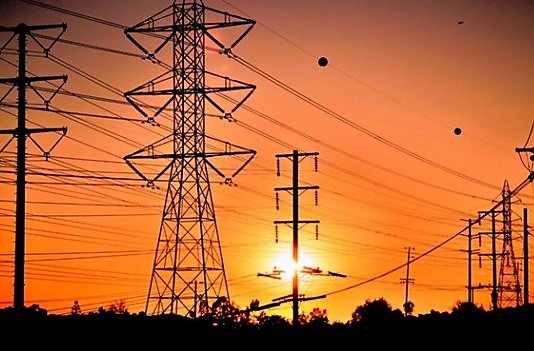Editor’s Note: As we prepare to begin the holy season of Lent tomorrow, it is a good time to reflect on our various attachments to material things and remind ourselves that, ultimately, we are dependent upon God. The following article is intended to provoke such reflection and discussion, not for the purpose of condemning modern technology (without which one could not read this online article), but to encourage a healthy Catholic spirit of detachment from the things of this world, which “passeth away” (1 John 2:17). May Our Lord grant us all a greater spirit of detachment, especially through our Lenten observances, so that we may attain to a deeper union with Him.
*****
Uber feminist and far-left MSNBC host Rachel Maddow has been pilloried by not a few conservatives for asking her television audience recently to imagine what would happen if Russia “killed the power” to the electrical grid in the upper Midwest during the Polar Vortex last month, where wind chill temperatures reached 40 below.
“What would you do if you lost heat indefinitely as the act of a foreign power on the same day the temperature in your front yard matched the temperature in Antarctica? I mean, what would you and your family do?” she asked.
While many of the views espoused by Maddow, a lesbian who lives with another woman but was raised in a Catholic household, deserve contempt, this particular hypothetical shouldn’t be met with immediate derision. There is a lesson to be learned here — if one digs deep enough.
Apart from her tiresome fear-mongering against Russia at the service of the New World Order, Maddow’s remarks at their root touch upon a most pressing matter with which Catholics who want to live out their faith and ensure the authentic common good is upheld should be concerned. They reveal how utterly dependent upon others modern man is, especially upon faceless energy corporations, and how much a precarious situation he is placed in vis-a-vis those who control his resources when he opts for the modern way of life.
Astute observers of today’s cultural, political, and economic patterns will notice what appears to be a deliberate attempt to not only gin up disgust for those who live in remote areas and small towns but to actively destroy, sometimes indirectly, but often times directly, the Christian way of life that goes along with it.
Consider the terrible phenomenon of suburban sprawl. It is increasingly difficult today, more so than in past decades, to take a leisurely Sunday drive into the country and find open space where birds and not Buicks make the most noise. This is due, at least in part, to a growing number of farmers selling off hundreds of acres of God’s green earth and in its place witnessing the erection of lifeless subdivisions with $350,000, hot tub-equipped homes occupied by two-income, two-child families where feminist mom and sports-obsessed dad work not on Main Street down the road but 50 miles away.
The net result of these pseudo-communities, where everyone is alone together, popping up in the middle of nowhere puts an immense amount of pressure on Christian parents who want to raise their children apart from the corrupting world, on healthy soil, and with an appreciation of work and the majesty of creation. It is, simply put, more difficult to get away.
Consider, also, the mass migration of young people from small towns and their inherent deep-rooted traditions to large metropolitan areas with their soul-crushing environs and radical universities, never to go back. Perhaps this has been the case for quite some time, but it seems to have sped up in recent decades thanks to television and movies promoting the idea that small towns are where, as Barack Obama once famously said, “bitter” simpletons who “cling to guns or religion” live. Thanks are also due to globalist economic policies that hollowed out these once-vibrant communities.
The effect of all this, likely intentional, is two-fold. One, to create a sort of class conflict between those in the cosmopolitan and learned cityscape and the college degree-less “fundamentalists” living out in the boonies. Two, to deplete the number of independent, self-sufficient citizens living off their own abilities and increase the number of dependent, controllable persons living in large, condensed areas. A family man who owns land, raises animals, grows his own food, and burns wood for heat or uses solar panels for energy is far more independent, and thus more of a threat to the goals of Freemasonry, than the subway-riding, child-free 30-something whose cooking skills amount to pressing the microwave’s “on” button and who rents a room on the 18th story of a gas-heated apartment building.
Ultimately, what Ms. Maddow should have asked her viewers was not to imagine the Midwest losing heat due to a “foreign power” hacking the electrical grid, but rather: Imagine if it was “your own government” (think CIA) or “a corporation” (think Enron) that did it. Better yet, she should have asked them to imagine not being on the electrical grid at all.
In De Regno, Aquinas says the more self-sufficient a thing is, the more dignified it is. As such, the more dependent a man is on others the less dignified he is (apart from natural, healthy social dependencies like family and local community, of course). Yet this is precisely the situation the modern world has created, where entire continents are reliant on a handful of powerful CEOs. In the packed, concrete jungles and overflowing seas of man-made steel in which helpless city dwellers toil, they are bombarded with temptations to sin around every corner, and, like cogs in a machine, are rendered virtually incapable of self-reliance. In the advertisement-free, sun-drenched fields of the country, man lives a much slower, calmer life where he is better able to insulate his family from the decisions made by Acme Energy’s greedy, un-Catholic Board of Directors.
It is for good reason that French Archbishop Marcel Lefebvre, on his Jubilee Anniversary in 1979, said, “I wish that, in these troubled times, in this degenerate urban atmosphere in which we are living, that you return to the land whenever possible. The land is healthy; the land teaches one to know God; the land draws one to God; it calms temperaments, characters, and encourages the children to work.”
Solange Hertz, long-time columnist for The Remnant and author of many insightful essays exposing the facade of the modern world and its sin-inducing comforts, has likewise excoriated the modern way of life. In her provocative book Beyond Politics, she described electricity as “Lucifer’s anti-grace.”
“Pervading the universe before the sun was created on the fourth day, electromagnetism cannot be evil in itself…but as Prince of this world, Lucifer was apparently at liberty to appropriate it to his own purposes,” she writes.
“Many an aged citizen today can look back on a youth spent without electricity. For thousands of years generations have lived happily without it, relying on simple mechanics and water power to provide their creature comforts, when suddenly, with the onslaught of the Enlightenment of the eighteenth century, it became a necessity.”
“Without electricity, civilized existence was deemed no longer possible. To civilize meant to electrify,” Hertz continues. “Usurping the role of the Holy Ghost as Paraclete and Consoler, electricity is the very soul of the city of man, indispensable elixir of progress.”
Hertz’s point is well taken, even if it is true that rejecting voltage altogether would be practically impossible and unwise. Regardless, the question remains: How long can modern man fast from electricity? Answer: probably about as long as it takes for a priest to say Mass.
Imagine, for instance, the chaos that would ensue if New York or Los Angeles lost power and day traders on the stock exchange couldn’t practice avarice, or if the diabolical producers of the filth that passes for “entertainment” these days weren’t able to spread promiscuity on the silver screen. Satan would be slain momentarily but would do everything in his power to get those impious currents of sin up and running again, thereby ensuring the men who run those rotten industries don’t escape his grip.
At the same time, how long does modern man go without confessing his sins or receiving Holy Communion? Weeks, months, years, sometimes decades pass and and man today is perfectly content to not have access to that which truly gives life: Jesus Christ. But should he not be able to watch the Super Bowl because his power is out or should he not be able to approve a stock trade due to his internet being down, revolution may break out by week’s end.
If there ever was a time the Satanic rulers of the modern world wanted to carry out their maniacal plans and do whatever they wanted to billions of God’s children, no time is as perfect as now. At present, more persons are totally dependent on them and their fleeting, natural resources and mammon-driven decisions and less dependent on God and His permanent, supernatural resources and infinite love than ever before.




